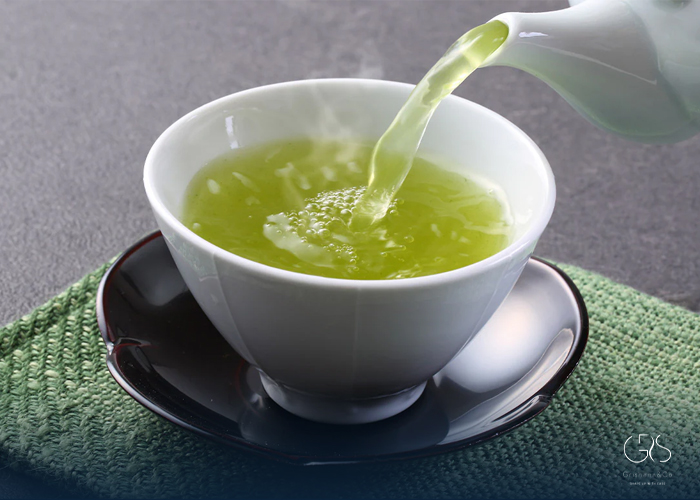Green tea, a beloved beverage with a rich history dating back centuries, has gained popularity not only for its refreshing taste but also for its numerous health benefits. From alleviating anxiety and stress to supporting bone health and cognitive function, this simple cup of tea offers a plethora of advantages that can significantly enhance well-being. Let’s delve into the 10 remarkable benefits of green tea and explore the nutritional profile, risks, best consumption practices, and more.
1. Alleviates Anxiety and Stress
Green tea contains L-theanine, an amino acid known for its calming effects on the mind and body. Research suggests that L-theanine can reduce anxiety and stress levels by promoting relaxation without inducing drowsiness. Incorporating green tea into your daily routine may help in managing everyday stressors effectively.
(Read more about the causes of anxiety)
2. Supports Bone Health
Studies have shown that the catechins present in green tea can help improve bone mineral density and reduce the risk of osteoporosis. Regular consumption of green tea, along with a balanced diet and exercise, can contribute to optimal bone health, especially in older adults.

3. Protects Against Cognitive Decline
The antioxidants found in green tea, particularly EGCG (epigallocatechin gallate), have been linked to improved cognitive function and a reduced risk of neurodegenerative diseases such as Alzheimer’s and Parkinson’s. Including green tea in your diet may help protect brain health and enhance cognitive abilities.
4. Improves Longevity
The longevity-promoting properties of green tea are attributed to its high antioxidant content, which helps combat oxidative stress and inflammation in the body. Long-term consumption of green tea has been associated with a lower risk of chronic diseases and a potential increase in lifespan.
5. Lowers Cholesterol
Green tea has been recognized for its cholesterol-lowering effects, particularly in reducing LDL (bad) cholesterol levels. The catechins in green tea may inhibit the absorption of cholesterol from the diet and promote its excretion, thereby improving heart health and reducing the risk of cardiovascular diseases.
6. Enhances Memory
Some studies suggest that the combination of caffeine and L-theanine in green tea can enhance cognitive function, improve memory, and boost alertness. Including green tea in your daily regimen may support mental acuity and memory retention.
7. Manages and Prevents Type 2 Diabetes
The polyphenols in green tea have been shown to improve insulin sensitivity and regulate blood sugar levels, making it beneficial for individuals with type 2 diabetes. Green tea consumption may help manage diabetes symptoms and reduce the risk of complications associated with the condition.
8. Lowers Stroke Risk
Research indicates that the regular consumption of green tea is associated with a reduced risk of stroke, thanks to its anti-inflammatory and vasodilatory effects. The antioxidants in green tea may help maintain healthy blood flow and protect against the development of blood clots that can lead to strokes.
9. Supports Weight Loss
Green tea is commonly recognized for its metabolism-boosting properties, which can aid in weight management and fat loss. The combination of catechins and caffeine in green tea has been shown to increase energy expenditure and fat oxidation, making it a valuable addition to a healthy weight loss regimen.
(Read more about Tea & Weight Loss)

10. Reduces Blood Pressure
The bioactive compounds in green tea, such as catechins and polyphenols, have been linked to a lowering of blood pressure levels. Regular consumption of green tea may help improve heart health by promoting vasodilation and reducing hypertension risk.
Nutritional Profile of Green Tea
- Calories: 2.37
- Fat: 0g
- Sodium: 2.37mg
- Carbohydrates: 0g
- Fiber: 0g
- Added sugars: 0g
- Protein: 0.52g
Risks of Green Tea
While green tea offers a myriad of health benefits, it is essential to be mindful of potential risks associated with its consumption, including caffeine sensitivity, interactions with medication, and possible digestive issues. Individuals with underlying health conditions should consult with a healthcare provider before increasing their green tea intake significantly.
Tips for Consuming Green Tea
To maximize the benefits of green tea and minimize potential risks, consider the following tips:
- Choose high-quality, organic green tea to ensure purity and avoid harmful additives.
- Limit your daily caffeine intake by monitoring your green tea consumption, especially if you are sensitive to caffeine.
- Avoid brewing green tea with boiling water to prevent the bitter taste and preserve its delicate flavor and nutritional properties.
- Experiment with different types of green tea, such as matcha, sencha, and gyokuro, to discover your preferences and enjoy diverse health benefits.
When Is the Best Time To Drink Green Tea?
The optimal time to drink green tea varies based on individual preferences and health goals. Some people prefer to enjoy green tea in the morning for a gentle energy boost, while others may find it beneficial in the afternoon to combat midday fatigue. Consider incorporating green tea into your daily routine based on your tolerance to caffeine and desired outcomes, such as relaxation, focus, or digestion support.

Types of Green Tea
Green tea comes in a variety of forms, each offering unique flavors and health benefits. Some popular types of green tea include:
- Matcha: A finely ground powdered green tea with a vibrant color and concentrated nutrients.
- Sencha: A steamed green tea with a refreshing taste and grassy aroma.
- Gyokuro: A shade-grown green tea known for its sweet flavor and umami notes.
Conclusion
Green tea stands out as a remarkable beverage that not only delights the palate but also nurtures the body and mind. Its wide-ranging benefits, from stress relief to weight management, make it a valuable asset in promoting overall well-being. By understanding its nutritional content, potential risks, and best consumption practices, individuals can harness the power of green tea to enhance their health and vital
Sources
- National Institutes of Health, Green Tea
- Harvard Health Publishing, Health benefits linked to drinking tea
- Medical News Today, What are the health benefits of green tea?










